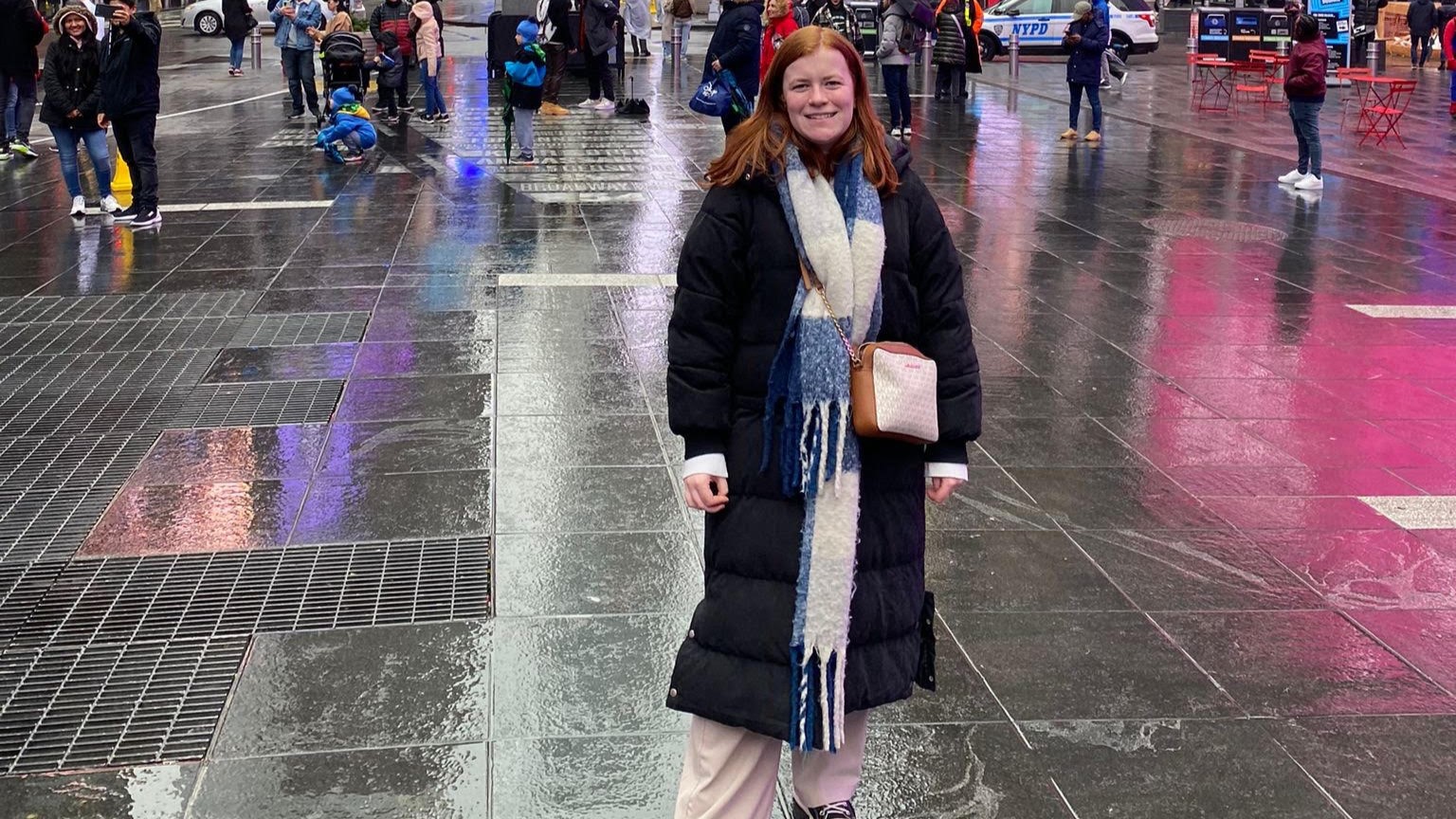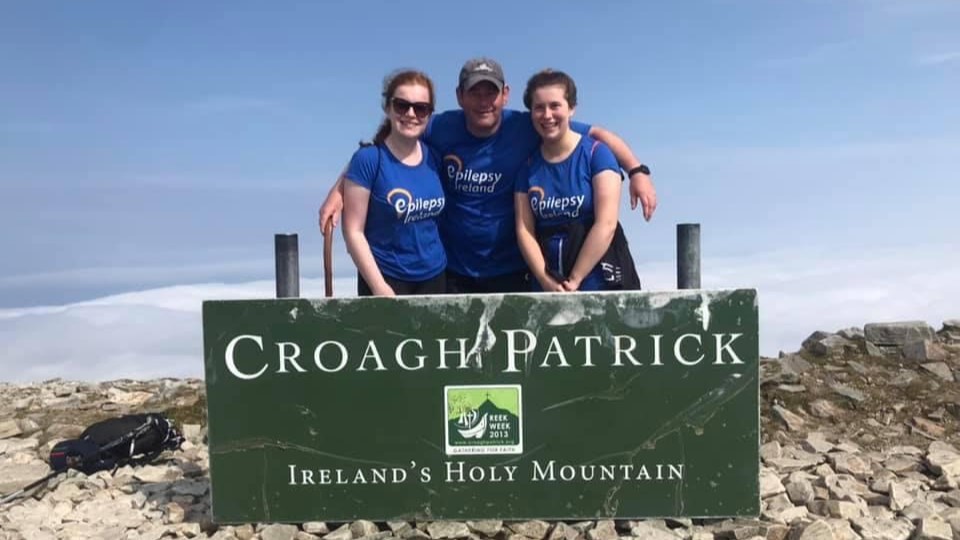
Cara has been working with Epilepsy Ireland since 2021
Ballina woman, Cara Martin, has been working with Epilepsy Ireland for three years now, with an aim to raise awareness and normality around the condition. International Epilepsy Day is an annual event and in 2024 it took place last Monday, February 12.
Cara, who is in her final year of a Business Management degree, spoke to The Mayo News, about her personal journey with epilepsy.
First diagnosed at 18 years old, Cara’s Leaving Certificate year had extra added stress than normal.
“I had two seizures that I knew of during my Leaving Cert year. The first one I had was actually in a friend's house, but her Mom has epilepsy, so I was actually very lucky in a way that she knew exactly what to do” she said.
After a visit to the hospital, she was told ‘not to worry’ as doctors said it was a ‘once off’, but a couple of weeks before her state exams, she suffered another seizure.
“My parents got very nervous and were worried and afraid because my Granny and her Mom had epilepsy, so it's hereditary in my family” she explained.
Cara decided to see a neurologist privately after this, and ended up taking a year out, meaning her plans to move off to college were placed on hold.
“I really, really wanted to go. I couldn't wait to move out, but unfortunately, I had to stay in my house almost 24/7. I worked a bit, but I had to be very careful of course, because I didn't really know enough about epilepsy” Cara said.
‘Obviously, epilepsy is not curable. You have to live with it’, but in her time at home Cara was trying medications and other options with the hope to become seizure free; something ‘a lot of people are very successful,’ with due to medication.

Cara in New York City
Within a year, she had become seizure free, her ‘medication was working’ and she ‘never had an issue’. Being seizure free in ‘less time than expected’ left Cara in a state of denial, as she ‘never really had to deal’ with her epilepsy head on.
Cara packed up and finally moved away for college.
“I got to do all the college things and experiences, moved away from home to Limerick. I had a lovely three years; I had my 21st, and had a great time” she said.
Unfortunately, after being seizure free for three years, last February, Cara suffered a ‘breakthrough seizure’.
“It happened in Limerick at a friend's house, so at the time they actually hadn't a clue what was going on. My boyfriend was there, and he knew straight away, he'd never seen me have a seizure, but obviously I had had conversations with him about it. He took me out of the room and calmed me down” told Cara.
This seizure was an ‘absent seizure’, where ‘you don't come out of consciousness, but you stare into a specific area, and people might ask your name or say something, but you do not respond’. Cara’s absent seizures only last up to 40 seconds, and when she comes back out of it, she ‘talks as if everything's okay’.
Since then, she has had two more seizures, one in the summer and one last October.
Cara described these seizures as ‘a very big shock’.
“Obviously, being in my fourth year of college now, it's not the best scenario. I've had to go back to my neurologist again and start with the medication. He's been upping my dosage and trying to get me back to being seizure free,” she explained.
Cara said sometimes, living with epilepsy can make ‘you feel quite alone’ as ‘no one else gets how you’re feeling’.
“You can try and explain it to someone, but they're just never going to get it”.
Triggers for Cara include sleep deprivation and alcohol, both of which ‘of course are involved in being a young adult’.
“Sometimes, my friends don't understand, no one probably is ever going to get it, but I think because of that, socially, it affects me as well,” said Cara.
At the time of joining Epilepsy Ireland, Cara had been seeing her neurologist ‘quite a bit, and he had suggested, if there were any kinds of programmes or groups that I could join’.
“He thought it might be a good idea to help me not only accept that I have epilepsy, but just be around other people.
“I found epilepsy Ireland, and I read a lot about them and I saw the amazing work they did, then I just signed up to become a member. There was a little section on the website that said about being a social media volunteer and I love social media, so I signed up for it” she said.
While she joined the group to raise awareness, Cara has ended up meeting people in the same boat along the way.
“Last year I got to go to a conference and I met all the other social media volunteers, and that was amazing. I think we all definitely benefited from that, but the only way we got to do that was because of Epilepsy Ireland” said Cara.
Epilepsy Ireland’s ‘biggest goal’ is to raise awareness ‘but they're also there to support you and be a friend; they always have the resources there if there's anything wrong, they'll always be there’ something that's very important to Cara and her family.

Cara and her family atop Croagh Patrick fundraising for Epilepsy Ireland
The 23-year-old explained there are many misconceptions around epilepsy, such as light sensitivity.
“When I say I have epilepsy, the first thing people say is, oh, so you're sensitive to light, but
only 3-5 percent of people with epilepsy suffer light sensitivity.
“I can still go to concerts and I can go see a movie in the cinema. That's not an issue for me, but for other people it would be” she said.
While Cara can experience these events normally, having epilepsy does come with some frustrating hoops to jump.
“I find it a lot harder to go places, even if I wanted to travel, like, if I want to go over to, say, London, I have to be certified by the neurologist to go”.
The main thing Cara would like is for those who do not suffer from epilepsy, to learn and be aware of what to do should someone around them get a seizure.
She said ‘people not understanding what to do’ makes her feel upset, and nervous. Since beginning her studies in Business Management, Cara has ‘noticed how people don't really talk about epilepsy and what to do in situations’.
“If there's a situation like that and there's no one there that knows what to do, then what happens? Because having a seizure can be very serious” she explained.
“Everyone knows how to do basic first aid, everyone knows how to do CPR, everyone knows how to do those things, but people don't know what to do when someone has a seizure.
“The biggest thing is trying to get the message out that it's not as difficult as you may think it is; the three words that they're trying to put out there at the minute are time, safe and stay.”
Although epilepsy is throwing its challenges at Cara at the minute, she hopes that's ‘not always going to be the case’.
“I think I'm quite happy that I did have the seizure, because whether I like it or not, it's made me accept having epilepsy”.
The Time, Safe, Stay message means to time the seizure, and if the seizure is over five minutes, to call an ambulance. Safe would be just to make sure that the area that the person is in when they're having the seizure is safe, and then stay would be to stay with them.
For more information on epilepsy and what to do in a situation where someone around you is having a seizure, see the Epilepsy Ireland website.
Subscribe or register today to discover more from DonegalLive.ie
Buy the e-paper of the Donegal Democrat, Donegal People's Press, Donegal Post and Inish Times here for instant access to Donegal's premier news titles.
Keep up with the latest news from Donegal with our daily newsletter featuring the most important stories of the day delivered to your inbox every evening at 5pm.